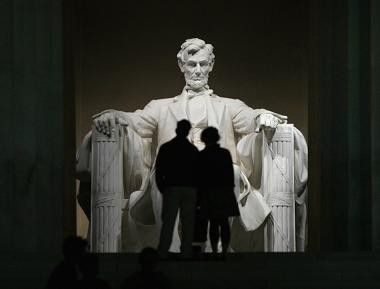What Has Happened To Lincoln’s Republican Party?
Analysis

The current era has been called a new Gilded Age.
Item: A political supporter, one of hundreds on New York's posh vacation treat, The Hamptons on Long Island, pays $50,000 oon a July day to see presumptive Republican Party presidential nominee Mitt Romney speak, and she says, in so many words, that, The problem with the United States today is that the common people don't understand how America works.
Item: Another individual pays approximately $80,000 for season tickets to the major league baseball team he follows. That's roughly $1,000 for each home baseball game -- not a flight from New York to Hawaii -- a baseball game.
The two adults, both Republicans -- both representative of a Republican Party that lives in a world of its own -- out of touch with the problems of the common people, with the plight of those no where near as fortunate as themselves.
A compelling question concerning our current political culture is: what has happened to the Republican Party?
The party of Abraham Lincoln, it has degenerated into a right wing extremist faction-led coalition of do-nothings.
The Republican Party, the majority party in the U.S. House of Representatives, is led by its extremist wing, the Tea Party faction -- and the Republican House is a do-nothing chamber. Add it to the Tea Party-influenced Republican caucus in the Senate -- who have the legislation-stopping filibuster power -- and you have a Do-Nothing Republican Congress, just like the Do-Nothing Republican Congress in 1947-1948.
Further, it bears repeating that the Republican Party was not always this way. It certainly wasn't the intent of the Republican Lincoln. And don't accuse Mr. Lincoln of not being a Republican: Abraham Lincoln is the reason the Republican Party became a national force: he was the first Republican Party nominee elected president, in 1860.
Mr. Lincoln: A Liberal For The Ages
Hence, it's important for present-day Republicans, and especially the very conservative Tea Party faction members, to learn about Abraham Lincoln.
First, Abraham Lincoln was a liberal. One could make a strong argument that Lincoln is not only the greatest liberal reformer in U.S. history, but in all of secular human history.
Don't think Lincoln was a liberal? Then look at the record: Emancipation Proclamation in 1863.
The Tea Partiers and others of conservative outlook will then likely argue, Oh, it was just a minor change, the Emancipation Proclamation.
Do you want to know how large and consequential the Emancipation Proclamation was in 1863? Let's put it this way, if a U.S. president today, via executive power, guaranteed a $10 per hour minimum wage, a free college education or a vocation education, and free, universal health care to every citizen, that president's act would still be less sweeping a change than Lincoln's Emancipation Proclamation.
The ardent Tea Partiers will then probably follow with something along the lines of, Oh, the Emancipation Proclamation wasn't that controversial of a reform. Everyone was and is against slavery.
No, everyone was not against slavery. In fact, an entire economic system was based on the use of slavery -- the Confederacy. And the Confederacy tried to both maintain and impose its system on the nation by fighting a civil war against the entire United States: the Confederacy was willing to destroy all of the Union states, if necessary, to save its cherished economic institution of slavery.
No, everyone was not against slavery. Further, more than 365,000 U.S. troops died fighting the Civil War, 1861-1865 -- the United States' greatest internal crisis -- to preserve the union of the United States and to ensure that slavery was abolished. (More than 260,000 Confederate troops also died.)
Lincoln Represented The Entire Nation
Second, Abraham Lincoln represented the entire nation, and his most serious actions were aimed at improving the lives of the oppressed and the poor. Lincoln's values and actions still rank as the greatest period of social activism in the United States. Lincoln's goal was to create a more perfect union by extending dignity to all -- to once and for all end a diabolical, brutal, and oppressive system in which humans were property, mere production instruments.
In other words, Lincoln's policies were designed for all of the people, not the just the wealthy, the privileged, or vested-interested lobbies.
Lincoln's moral courage, fortitude, and virtue are the reasons he is exalted today. It's often been said that, 'There are no saints in Protestant America, but if there ever was one, it was Abraham Lincoln.'
Study the famous portrait of Lincoln in 1863. The stress of the war is noticeable on Lincoln's face -- the face is drawn, with the eyes aged with the demands and pressures of battle-field decisions, and the responsibilities of the nation. It is also the face of virtue.
Lincoln's liberal reforms and his placing the interest of the entire nation above a conservative faction are the reasons the United States remained one nation after 1865. And it's the reason we honor him with the Lincoln Memorial in Washington, D.C., whose inscription reads:
IN THIS TEMPLE
AS IN THE HEARTS OF THE PEOPLE
FOR WHOM HE SAVED THE UNION
THE MEMORY OF ABRAHAM LINCOLN
IS ENSHRINED FOREVER
Now fast-forward to today. Would Lincoln, the Republican Party's first president, recognize the Tea Party faction-led Republican Party today?
The irony should be obvious to all: the values of today's Tea Party faction-led Republican Party -- very conservative, against helping the poor, the oppressed, and those in society who have been marginalized, against federal solutions to national problems -- are diametrically opposed to the values of Lincoln.
To say that Tea Party members are woefully misguided and wrong would be an understatement, and perhaps the mildest critique of the faction.
Here's a more-illuminating critique: they're a lot like the people who opposed Abraham Lincoln in 1861.
--
© Copyright IBTimes 2025. All rights reserved.





















